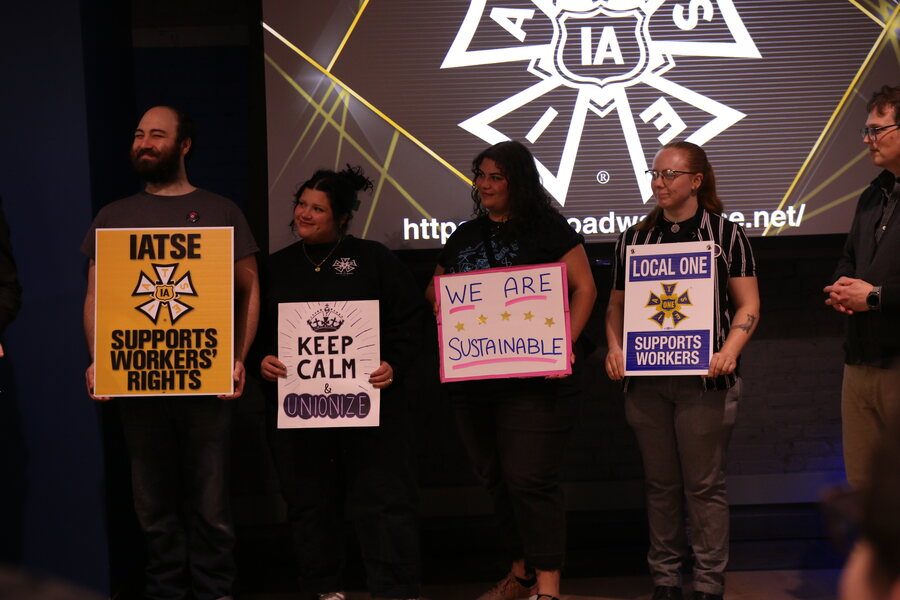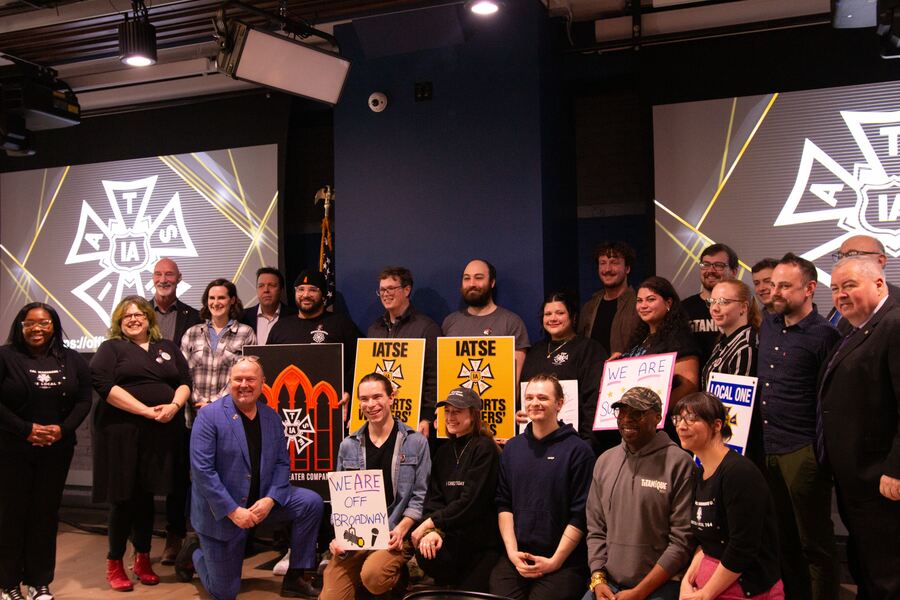When Sarala Pool was in college, she dreamed of working Off-Broadway. She wanted to harness her skills to make magic happen onstage at places like the Public Theater. Her dream came true as assistant prop manager on Suffs in 2022, but the job, like all Off-Broadway gigs, was short-lived. She left it scrambling for another job with health insurance as coverage from her parents’s insurance expired.
“The Public Theater is my favorite place I’ve ever had the privilege to work at,” Pool said at a Feb. 29 press conference at the International Alliance of Theatrical Stage Employees (IATSE)’s Local 1 hall. “If I could have afforded to stay, I would have.”
Pool was speaking with a group of Off-Broadway stagehands and technicians echoing the call for their colleagues to join IATSE. Recent election victories for the crews of Titanique and the Atlantic Theater Company have spurred momentum for the union, which represents stagehands and shop construction crews across multiple areas of the entertainment industry. The Vineyard Theatre voluntarily recognized its crew’s union, bypassing the need for an election, while the crew of Little Shop of Horrors is waiting to see how its leaders respond to their recent unification. This week, the house staff at the Goodman Theatre in Chicago also filed for an election with IATSE; many of the Goodman’s stagehands already work in IATSE contracts.
As of the time of the press conference, workers at the Public were waiting to hear if the board of directors would voluntarily recognize their union. Last week, however, the Instagram account @unionizethepublic announced that they would head to an election, which was confirmed by an IATSE representative.
“The Public has been working with theatrical unions for decades, including with IATSE in our production department,” the theatre’s director of communications, Julie Danni, said in a statement to American Theatre. The Public is “currently engaged in robust conversations with IATSE representatives.”
The timeline of the election remains unclear, though the enthusiasm for unionization Off-Broadway is crystal.

While some emerging designers work stagehand and other crew jobs as they develop their design portfolios, many theatre artists simply want to work backstage full-time. In Off-Broadway theatres, that can leave a gap between unionized designecars and their associates on the one hand, and non-union crews on the other, who may know the ins and outs of a shop better than a visiting designer but don’t have the same access to health insurance, retirement benefits, or supervisors trained in specific safety protocols. (Some theatres may also hold specific positions for union contracts and hire non-union workers for other roles, further stratifying workers.)
The crew at the Atlantic regularly helps bring to life productions that transfer to Broadway, like the Tony winner Kimberly Akimbo and this season’s Days of Wine and Roses. But while Broadway productions are fully unionized, the people constructing and maintaining set pieces, props, costumes, and wigs backstage at the Atlantic weren’t represented until earlier this year.

The Atlantic, which produces work at two stages in Chelsea, doesn’t have enough space for a traditional scene shop. Instead, crew members work outside in an alley by St. Peter’s Episcopal Church, the home of the theatre’s mainstage. When it’s hot, crew members drag out fans and a tarp for shade. When it’s cold, they wear layers.
“There’s been issues with snow falling off the roof, because it’s a raked roof,” Mikey Stevens, an Atlantic worker, said in an interview. “That creates a hazard for anyone who’s outside.”
“We did finally get snowguards, though,” Francis, Stevens’s coworker, said in the same interview.
“But one of them broke off,” Stevens added.
When the Atlantic crew filed with the National Labor Relations Board in November 2023, both IATSE and the Atlantic were able to hire legal representation, a standard part of the unionization process. The theatre chose the employment firm Littler Mendelson P.C., which is representing Starbucks in their current crackdown against unionizing store employees across the country, as well as Amazon in a suit against the Department of Labor over whether the company must report how much it spends on anti-union organizing. The Atlantic did not respond to requests for comment.
Not all theatres have responded similarly. A representative of IATSE said that staff from the Vineyard announced the voluntary recognition of their crew’s union at a fundraiser, reportedly to applause from the audience.
“There’s an overwhelming support among people under the age of 30 for labor unions,” said IATSE international representative Daniel Little, who helped organize workers at the Philadelphia Theatre Company before working for IATSE, in an interview. “Which also, coincidentally, lines up fairly similarly with the demographic makeup of people working Off-Broadway.”
Little was referencing polls from the Center for American Progress and the AFL-CIO, the largest federation of unions in the country. Theatre is already a heavily unionized industry, with artists in United Scenic Artists 829, IATSE, Actors’ Equity, and the Stage Directors and Choreographers Society, among others. Last summer’s highly publicized and contentious entertainment industry strikes from the Writers Guild and the Screen Actors Guild further galvanized arts workers seeking representation, from playwrights to stagehands. (Recently, workers at Manhattan’s REI even collaborated with the Working Theater to stage a play about unionizing their store.)
“This is a group of people who are very passionate about the work they’re doing,” Brad Sievers, the head of sound at Titanique, said in an interview. “The perception is: If you wanted healthcare, if you wanted benefits, you could’ve gone into business.” Sievers and his Titanique coworkers believe that the bootstraps narrative prevalent in American work culture is just as infectious, if not more, in the theatre industry, with damaging effects. “There’s no reason why theatre can’t be something that we love to do and we can support ourselves doing it.”
Jennie Gorn, Titanique’s A2, has worked at the Atlantic before, but left because of what they considered unsafe working conditions and the fear that they could hurt themself without the protection of health insurance or worker’s compensation. “I would love to continue working at the Atlantic in an environment that I feel a lot more safe and secure in, knowing that if anything happened to me,” there would be a trusted process to report and address their injury. “I dropped a sound console on my finger the last time I was at the Atlantic. Luckily nothing happened, but I had a huge blood blister,” they said.

Pool, a props designer, has similar stories of alleged workplace safety violations at various Off-Broadway theatres, especially because she has had “a lot of experience working with hazardous chemicals.” She added, “Very few Off-Broadway theatre shops in New York have spray booths. A lot of times our ‘spray booth’ is opening up a window and turning on a fan,” referring to proper protocols for spray painting. “When I was really young and didn’t know the difference between a dust mask and a respirator, I made some very poor choices.” Pool believes the high rate of employee turnover Off-Broadway—which could change if more shops are unionized—has contributed to an unsafe working environment, which lacks senior staff trained in safety protocols.
“There’s no one to tell the younger generation what kind of safety equipment they have to wear to protect themselves,” said Pool, who said she developed a latex allergy from breathing in too much plastic dust. “Having the ability to stay at your workplace and teach what you know to people that come after you helps people stay safe.”
Not everyone has the same experience working Off-Broadway. Some stagehands haven’t faced safety issues; some are young enough to remain on their family’s health insurance, assuming they have it. The unionization call isn’t intended to demonize leaders or exploit an economically precarious industry, as some producers have characterized it. Rather, the effort to unionize Off-Broadway crews emerges from the labor of frustrated workers who don’t want to see any of their fellows exploited—whether they’re new to the industry or veterans.
Gorn, smiling in their stage blacks, summed it up: “It’s solidarity.”
Note: A previous version of this story misidentified the Public Theater as having an unsafe spray painting booth. The incident described took place at a different Off-Broadway theatre, and the story has been updated for clarity.
Amelia Merrill (she/her) is a journalist, playwright, and dramaturg. A contributing editor at American Theatre, her work has been featured in Mic, Hey Alma, Narratively, and more. @ameliamerr


